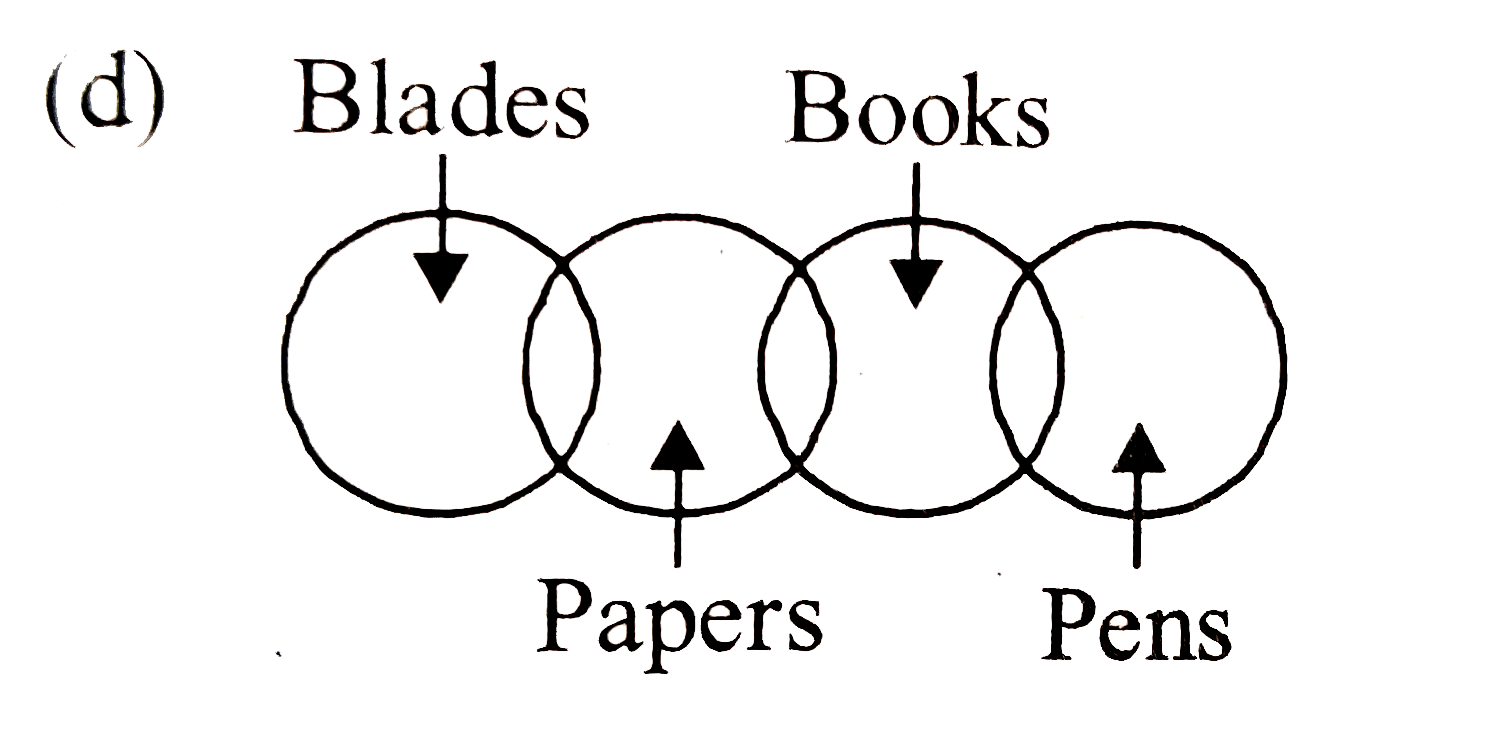Statements:
Some blades are papers
Some papers are books
Some books are pens
Conclusions:
I. Some pens are papers
II. Some books are blades
III. Some pens are blades.
Only I follows
Only II follows
Only I and III follows
Only I and II follow
The correct Answer is:D

Conclusion
I. False
II. False
III. False
All the three premises are I-type
Hence no conclusion follows
Topper's Solved these Questions
Similar Questions
In given questions below are given three statements followed by three conclusions numbered I,II,and III. You have to take the given statements to be true even if they seem to be at variance from the commonly known facts. Read all the conclusions and then decide which of the given conclusions logically follows from the given statements disregarding commonly known facts.
Statements: Some blades are hammers. Some hammers are knives. Some knives are axes.
Conclusion: I. Some axes are hammers.
II. Some knives are blades.
III. Some axes are blades.
(a) None follows
(b) Only I follows
(c) Only II follows
(d) Only III follow
(e) None of these.View SolutionDirections: In the question below are given three statements followed by three conclusions numbered I,II and III. You have to take the given statements to be true even if they seem to be at variance with commonly known facts. Read all the conclusions and then decide which of the given conclusions logically follows from the given statements, disregarding commonly known facts.
Statements: a. Some blades are hammers.
b. some hammers are Knives.
c. Some knives are axes.
Conclusions: I. Some axes are hammers.
II. Some knives are blades.
III. Some axes are blades.
1)None follows
2) Only I follows
3) Only II follows
4) Only III follows
5) None of theseView Solution
Knowledge Check
- Question 1 - Select One
Statements:
Some books are pens
Some pens are muttons
Some mutton are buttons
Conclusions:
I Some buttons are pens
II. Some muttons are booksAIf only conclusion I followsBIf only conclusion II followsCIf either conclusion I or conclusion II followsDif neither conclusion I nor conclusion II follows - Question 2 - Select One
Statements: 1. Some papers are pens
2. Some pencils are pens
Conclusions: 1. Some pens are pencils
2. Some pens are papersAonly conclusion 1 follows,Bonly conclusion 2 follows,Ceither conclusion 1 or 2 follows,Dboth conclusion 1 and 2 follows, - Question 3 - Select One
Statement: All boxes are pens. Some shirts are boxes some Toys are pens.
Conclusion: I. Some toys are definitely not boxes
II. Some shirts can never be pens.AOnly II followBonly I followsCEither I nor II followDBoth I and II follows
In given questions below are given three statements followed by three conclusions numbered I,II,and III. You have to take the given statements to be true even if they seem to be at variance from the commonly known facts. Read all the conclusions and then decide which of the given conclusions logically follows from the given statements disregarding commonly known facts.
Statements: Some pens are books. All schools are books. Some colleges are schools.
Conclusions: I. Some college are pens
II. Some pens are schools.
III. Some colleges are books.
(a) Only I and II follows
(b) Only II and III follows
(c) Only I and III follows
(d) All follows
(e) None of these.View SolutionStatements: a Some cards are papers.
All papers are vans.
c. Some vans are trams.
Conclusions: I Some cards are trams.
II Some papers are trams.
III Some trams are papers.
IV. Some vans are cards.View SolutionStatement : All Cameras are books
Some pens are Cameras.
Conclusion: I. All pens are books
II. Some books are pensView SolutionRead the statements and select a conclusion from the given alternatives:
Statements:
All pensare pencils. Some pencils are erasers. Some erasers are ropes. All ropes are tents
Conclusions:
I. Some tents are trams
II. Some ropes are pens
III. Some erasers are pens
IV. Some pencils are pens.View SolutionStatement : Some books are penciIs.
Some penciIs are pens.
Conclusions: Some books are pens.
II Some pens are booksView Solution

